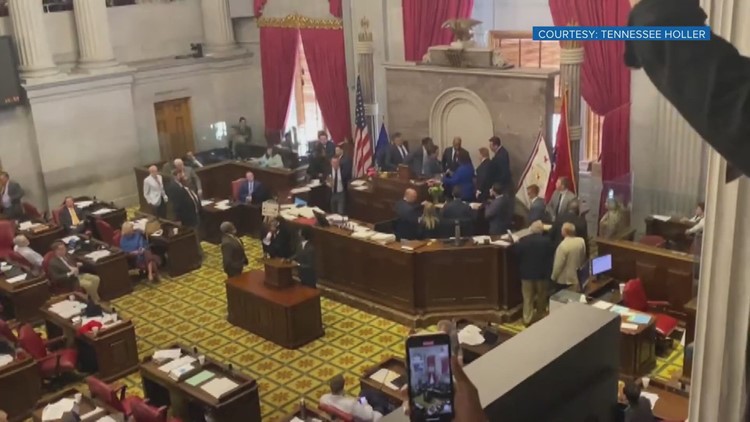NASHVILLE, Tenn. — Tennessee's Republican-dominant Statehouse quickly adjourned last week after attracting national attention for the high-profile expulsion of two now-reinstated Democratic members, the refusal to address gun control following a fatal school shooting, and the resignation of a GOP member found in violation of workplace harassment rules.
Tennessee Republican Gov. Bill Lee plans to call lawmakers into a special session after they declined to consider his proposal to keep firearms away from people who could harm themselves or others.
Still, lawmakers passed hundreds of other bills this session that were overshadowed at times by the chaotic finish. Lee has already signed some into law, and chances are slim that he would reject others — Lee has never vetoed a bill.
Here are some key approved bills:
ROADS
The governor's road package allows express toll lanes to be built on some highways; increases fees on electric vehicles from $100 to $200 in 2024, and in 2027, to $274; creates a $100 fee for hybrid vehicles; adjusts both fees for inflation up to 3% annually starting in 2028; puts $3 billion in a state fund for roads projects; and includes $300 million in transportation grants for local governments.
ABORTION
A narrow exemption to one of the nation's strictest abortion bans would allow doctors to use "reasonable medical judgment" when determining an abortion is necessary to save a pregnant patient's life or to spare her from irreversible, severe impairment of a major bodily function. Another bill bans local government from using taxpayer funds to assist public employees in receiving abortion care, including services out-of-state. The budget includes $20 million for anti-abortion "crisis pregnancy centers."
PUBLIC EMPLOYEES
Some changes for public workers would: allow for six weeks of paid leave for teachers and most state employees following the birth or adoption of a child; make Juneteenth a state holiday; put $15.9 million toward market pay adjustments for Department of Children's Services case managers; use $125 million for teacher raises; and raise the minimum base pay for teachers up to $50,000 for 2026-2027 while banning educators from deducting dues for professional organizations from their paychecks.
CRIMINAL JUSTICE
Lawmakers acted to create a board with authority over sentence reduction credits awarded to inmates by facility wardens.
SCHOOL SAFETY
Last month, a Nashville Christian school shooting killed six people, reigniting a debate over Tennessee's relaxed gun laws. Despite pleas from affected parents, lawmakers resisted restricting access to firearms and instead advanced proposals funding school resource officers in public and private schools; money for private and public school security upgrades; and requiring every school to develop annual safety plans to the state. Separately, lawmakers moved to further protect gun and ammunition dealers, manufacturers and sellers against lawsuits.
LGBTQ+ ISSUES
Further targeting the LGBTQ+ community, lawmakers moved to ban gender-affirming care for minors. They also restricted where certain drag shows can happen, though a federal judge has blocked that law. Other changes would protect teachers from lawsuits if they don't use a transgender student's preferred pronouns; define male and female in state law in a way that prevents transgender people from changing their driver's licenses or birth certificates; and ban private schools under the Tennessee Secondary School Athletic Association from letting transgender students play female sports associated with their gender identity. Some of the bills came with warnings that Tennessee could risk losing hundreds of millions of federal dollars because they likely violate federal regulations on sexuality and gender identity. Lawmakers dismissed the concerns.
TARGETING NASHVILLE
After Nashville's metro council declined to host the 2024 Republican National Convention in the city, Republican lawmakers made several moves to accelerate a years-long fight to limit the progressive-leaning city's powers. They sought to cut the 40-member council in half, but the move is temporarily blocked in court. Other changes would replace the locally selected Nashville airport board with a majority of state appointees, and let state officials select six of the 13 members on the city's board overseeing professional sports facilities. Additionally, another bill would gut community oversight boards over police departments, including in Nashville, where the panel was voter-approved.
DEATH PENALTY
Lawmakers passed a bill targeting the power of district attorneys to alter an inmate's death sentence. The move comes after district attorneys in Davidson and Shelby counties agreed to lesser sentences for death row inmates in cases where it later came to light that the jury was tainted by racism or the inmate was intellectually disabled. The bill gives Tennessee's attorney general exclusive power to represent the state in most death penalty appeals. Lawmakers also passed legislation allowing juries that impose a death sentence to have the defendant's sentence expedited in certain cases and carried out within 30 business days of the conclusion of all appeals and post-conviction relief. Those qualifying cases include defendants who: killed three or more victims using a firearm; committed an offense on school property using "deadly weapons;" or killed a first responder. The actions come as executions remain paused due to significant oversights found in Tennessee's lethal injection processes.
TAX BREAKS, INCENTIVES
Officials approved a variety of tax breaks and incentives, including: $273 million for a three-month sales tax holiday on groceries; more than $150 million in annual tax breaks aimed mainly at small businesses; and $350 million for improvements at sports venues in Memphis. Lawmakers also passed legislation to prevent companies from receiving state economic incentives if they use the "card-check" method to organize a union — a simpler method to unionize than a secret ballot. A massive Tennessee electric vehicle and battery project by Ford and a partner company would be exempted.
EDUCATION CHANGES
Republicans passed legislation to ban Tennessee public schools and universities from requiring employees to take "implicit bias" training. Last year, they restricted how teachers address race in classrooms. Additionally, lawmakers agreed to expand the state's school voucher program to include Hamilton County, a large school district that encompasses Chattanooga. The program, which allows eligible families to use tax dollars to pay for private school expenses, has only applied to Nashville and Memphis areas.
___
Associated Press writer Travis Loller in Nashville, Tennessee, contributed to this report.



